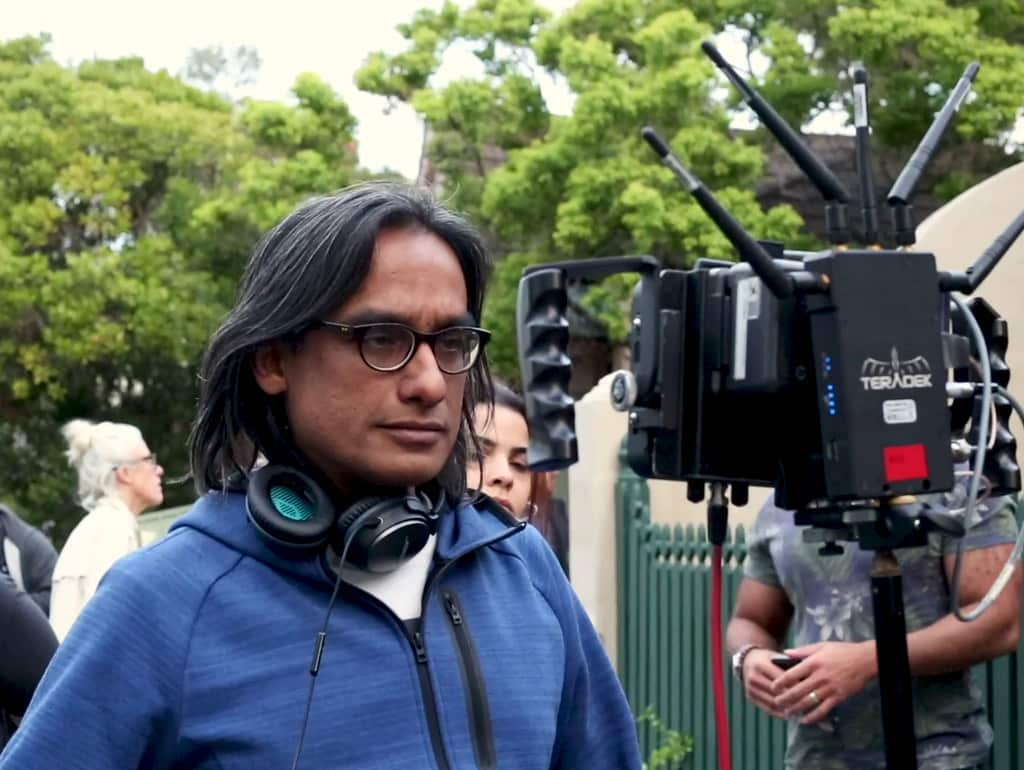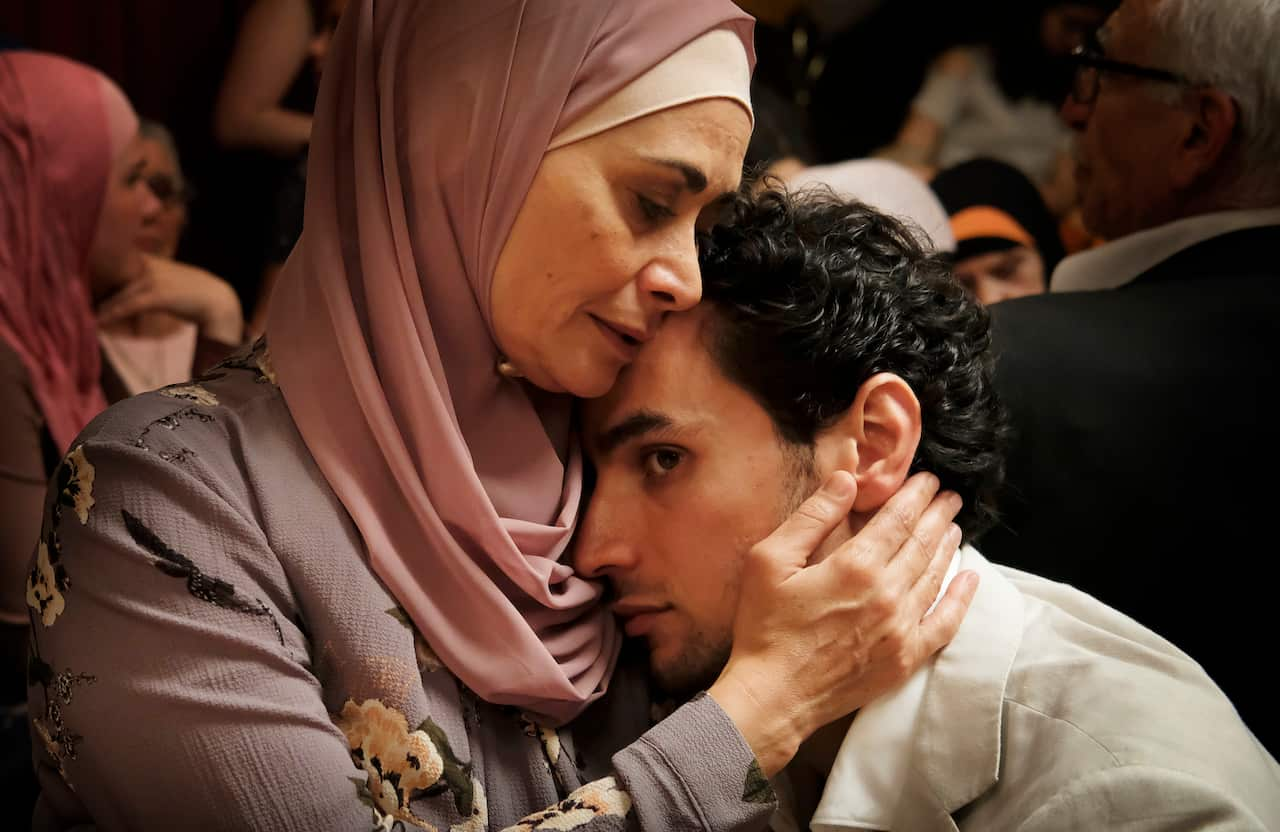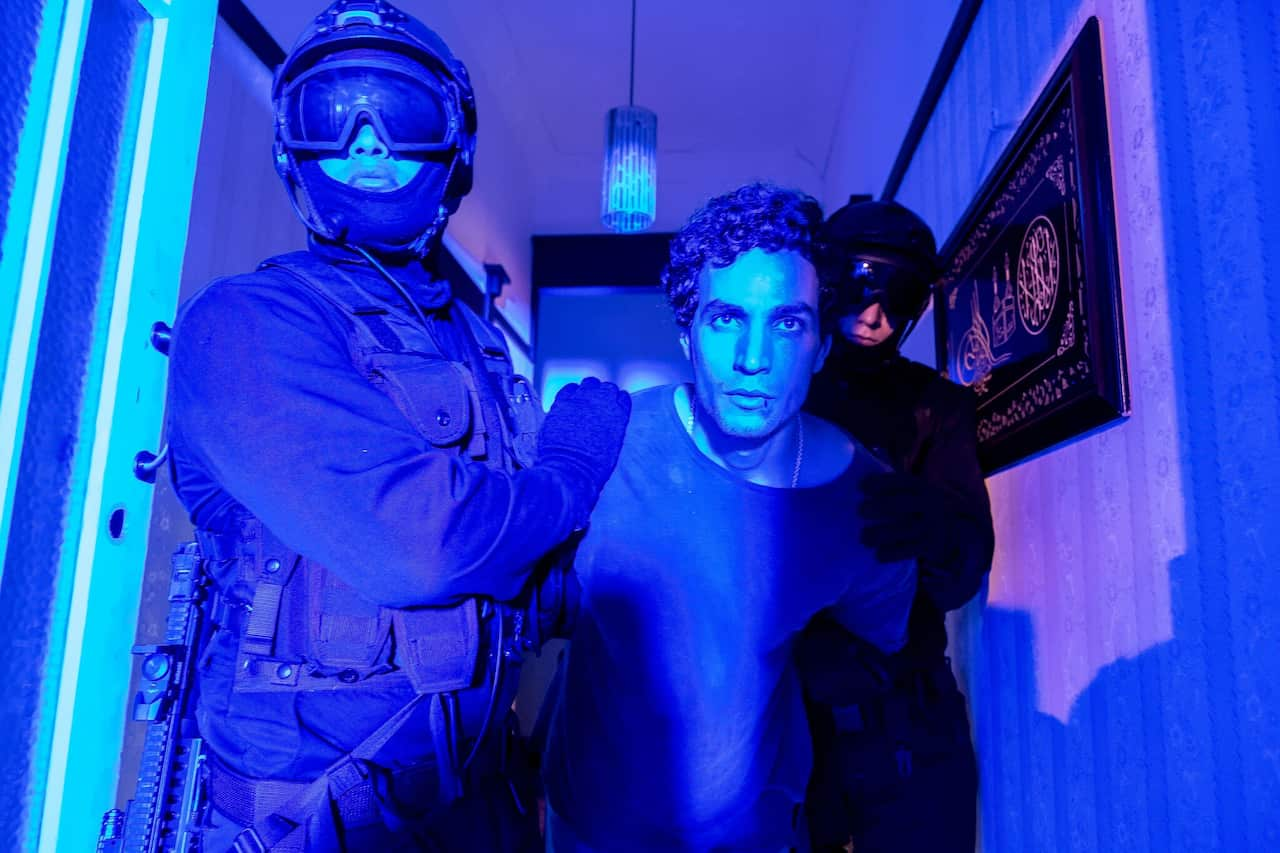The resilient steel in Danielle Horvat’s eye holds the camera captive as she punches out the empowered words of late activist poet Candy Royalle in the opening scene of Slam. Her brilliant red hijab gleams in the darkness of the shot, as if floating in a void burst open by this rage-filled rally cry against Islamophobia and the dislocation of our Indigenous peoples.
The film, Indian-born, Sydney-based writer/director Partho Sen-Gupta’s third feature – his first predominantly in the English language – is dedicated to Royalle. “When I was looking for a poet, and I wanted a female and POC voice, I asked around in the poetry community, and Miles Merrill from the Australian Poetry Slam introduced me to her,” he says. “When I spoke to her, there was no doubt that she would be perfect. She was a Palestinian Australian, and what I wanted her to write about was her lived experience.”
Royalle’s luminous spirit inhabits Horvat’s character Ameena Nasser. A Palestinian migrant, she rejects the notion of begging for acceptance in the face of rampant Islamophobia that, when Sen-Gupta started to write the movie in 2015, was arguably being stoked by then Prime Minister Tony Abbott.

Ameena is at the heart of the film even though she is, for the most part, missing. “I wrote Slam after seeing a young, hijabi-wearing woman on stage at the Bankstown Poetry Slam,” he recalls of his initial exploration of Western Sydney after relocating with his sociologist partner Alana Lentin in 2012. “She spoke this very strong, revolutionary prose and visually I said to myself that this is amazing, because the idea that we are given by mainstream media about these women is of them being oppressed and completely under the thumb of patriarchy, but here stood a woman who completely contested that idea and I thought, ‘wow, this is a beautiful visual, I have to do something about it’.”
Bathed in blue light while fiddling with her phone outside the venue, this image, coupled with the politically charged climate in Australia, inspired him to pen a script positing her disappearance shortly after the performance. Ameena will not assimilate. When she vanishes, both the cops and the media suspect she has travelled overseas to fight with ISIS, setting in motion an aching search by brother Tariq, who goes by the Anglified name Ricky and is played by Palestinian actor Adam Bakri (Omar), and by Lantana star Rachael Blake’s white police detective.

Slam is an examination of the aftermath of trauma and the barriers faced by migrant cultures expected to assimilate on arrival in Australia. Sen-Gupta understands this outsider status. He was born to Hindu Bengalis forced to leave their ancestral homeland at the Partition of India in 1947, which claimed some 2 million lives, and who lived in refugee camps. “My father, as a young man, would come to Mumbai in the west of India to find work, and I was born there,” he recalls. “I grew up speaking Marathi, the local language, but he would always tell us that we’re not from here. Our land was beautiful, with bountiful rivers.”
Tariq encounters this push-back even though he wants to blend in. “I wanted to write something about the idea of a migrant who tried hard to assimilate in another country, but slowly in that desire, which is something very honest and naïve, one forgets that there are other aspects like race and skin colour, and your accent, that will never, never change.”
As he begins to change in the face of such resistance, so to does Joanne, whose prejudices are complicated by the death of her soldier son in Afghanistan.
“Joanne is the mirror of Tariq,” Sen-Gupta says. “She accepts the dominant discourse and mythology, but after the violent death of her only child in a distant war, she begins to question that discourse. When she’s brought on to the supposedly ‘open and shut’ case of Ameena’s disappearance, she begins to realise how power works over the lives of simple people and, like Tariq, decides that she too must rise up.”

They are confronted with the noxious abuse fired at Ameena on social media, and it’s not just anonymous keyboard warriors who perpetuate this violence. Drawing on real-life headlines, there’s a scene set at a party where Tariq suddenly finds he is held apart by mates after a news announcement that an Australian fighter jet has been shot down. “Suddenly there is a separation in the room, everyone sort of teams up together against him and his wife is left with no choice but to stand by him, and she does. That is the beginning, in a way, of the film, as Tariq realises that this is real, and he will never be able to bridge this gap.”
New York-based Bakri is no stranger to subtly cutting shifts, but he did have to master an Aussie accent with the same vocal coach who aided Dev Patel in Lion. Sen-Gupta says the challenge was worth it, as his eyes remind him of that girl he once saw in Bankstown, in their expressiveness. “He has melancholic eyes, and I wanted that melancholy in the character, because the character isn’t very verbose, so I needed those eyes to speak.”
Slam speaks loudly about the need for change in this country. “As an artist, I’m not accusing any person, it’s the system that I accuse,” Sen-Gupta says. “People will change in governments, but the systemic use of this violence is what I’m trying to decry in the film.”
Slam next screens at the Screen Wave International Film Festival in January, on the mid-north coast of New South Wales, Australia,
Follow the author here: @SARussellwords
